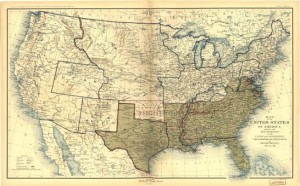 Skirmishes continue in north Georgia as Rebels strive to disrupt Union supply lines between Nashville and Atlanta. Attacking the Union-occupied cities of the Deep South is out of the question for the vastly weakened Confederacy’s Army of the Tennessee. Being an annoyance and worry to the Federals is about the best the Rebels can do now.
Skirmishes continue in north Georgia as Rebels strive to disrupt Union supply lines between Nashville and Atlanta. Attacking the Union-occupied cities of the Deep South is out of the question for the vastly weakened Confederacy’s Army of the Tennessee. Being an annoyance and worry to the Federals is about the best the Rebels can do now.
Near the Confederate capital of Richmond, Virginia, trench warfare continues. Union General Ulysses S. Grant is determined to outmaneuver Confederate General Robert E. Lee‘s Army of Northern Virginia and reach Richmond. Inch by inch Grant is succeeding, forcing Lee’s dwindling forces to stretch ever thinner.
Throughout the Southern landscape, the figurative dark clouds grow ever more ominous for a nation struggling to survive even as it ripped asunder.
An article in this week’s South Carolina Confederate Baptist strikes close to home regarding the problem of Confederate Army deserters. Some two-thirds of Confederate soldiers have already deserted, and more are leaving daily. Home front elites resort to propaganda to downplay the problem, such as this short piece that places any blame on home front complainers.
A young soldier, on furlough, observed to us that he had become dispirited by what he had heard at home, and would have to go back to the army to regain his confidence. “In the army,” said he, “we know our strength and we feel assured of success.” Let the people at home profit by this incident, and not pour their dolorous complaints into the ears of our valiant defenders. Every boy knows that a stone thrown into a pond will silence the frogs; and we believe that a shell or two cast into the snug retreats of these croakers would put a stop to their clamor. They need a good, searching raid to rouse them to a manly tone and hearing.
Source: “Croaking at Home,” Confederate Baptist, October 5, 1864


